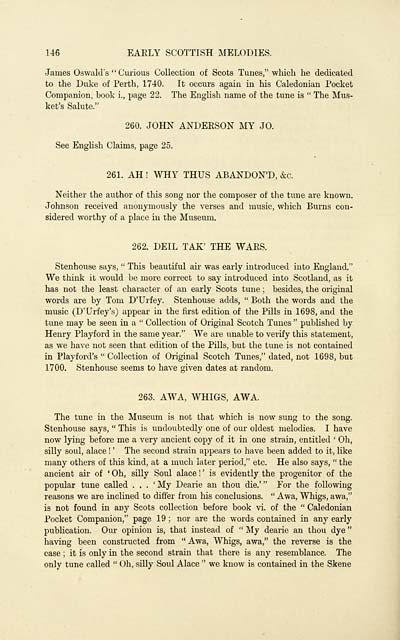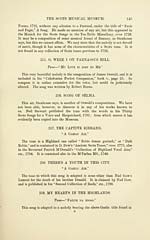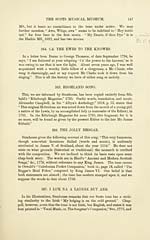Inglis Collection of printed music > Printed text > Early Scottish melodies
(168) Page 146 - John Anderson my Jo
Download files
Complete book:
Individual page:
Thumbnail gallery: Grid view | List view

146 EARLY SCOTTISH MELODIES.
James Oswald's " Curious Collection of Scots Tunes," which he dedicated
to the Duke of Perth, 1740. It occurs again in his Caledonian Pocket
Companion, book i., page 22. The English name of the tune is " The Mus-
ket's Salute."
260. JOHN ANDERSON MY JO.
See English Claims, page 25.
261. AH ! WHY THUS ABANDON'D, &c.
Neither the author of this song nor the composer of the tune are known.
Johnson received anonymously the verses and music, which Burns con-
sidered worthy of a place in the Museum.
262. DEIL TAX' THE WARS.
Stenhouse says, " This beautiful air was early introduced into England."
We think it would be more correct to say introduced into Scotland, as it
has not the least character of an early Scots tune ; besides, the original
words are by Tom D'Urfey. Stenhouse adds, " Both the words and the
music (D'Urfey's) appear in the first edition of the Pills in 1698, and the
tune may be seen in a " Collection of Original Scotch Tunes " published by
Henry Playford in the same year." We are unable to verify this statement,
as we have not seen that edition of the Pills, but the tune is not contained
in Play ford's " Collection of Original Scotch Tunes," dated, not 1698, but
1700. Stenhouse seems to have given dates at random.
263. AWA, WHIGS, AWA.
The tune in the Museum is not that which is now sung to the song.
Stenhouse says, " This is undoiibtedly one of our oldest melodies. I have
now lying before me a very ancient copy of it in one strain, entitled ' Oh,
silly soul, alace ! ' The second strain appears to have been added to it, like
many others of this kind, at a much later period," etc. He also says, " the
ancient air of ' Oh, silly Soul alace ! ' is evidently the progenitor of the
popular tune called ..." My Dearie an thou die.' " For the following
reasons we are inclined to differ from his conclusions. " Awa, Whigs, awa,"
is not found in any Scots collection before book vi. of the " Caledonian
Pocket Companion," page 19 ; nor are the words contained in any early
publication. Our opinion is, that instead of " My dearie an thou dye "
having been constructed from "Awa, Whigs, awa," the reverse is the
case ; it is only in the second strain that there is any resemblance. The
only tune called " Oh, silly Soul Alace " we know is contained in the Skene
James Oswald's " Curious Collection of Scots Tunes," which he dedicated
to the Duke of Perth, 1740. It occurs again in his Caledonian Pocket
Companion, book i., page 22. The English name of the tune is " The Mus-
ket's Salute."
260. JOHN ANDERSON MY JO.
See English Claims, page 25.
261. AH ! WHY THUS ABANDON'D, &c.
Neither the author of this song nor the composer of the tune are known.
Johnson received anonymously the verses and music, which Burns con-
sidered worthy of a place in the Museum.
262. DEIL TAX' THE WARS.
Stenhouse says, " This beautiful air was early introduced into England."
We think it would be more correct to say introduced into Scotland, as it
has not the least character of an early Scots tune ; besides, the original
words are by Tom D'Urfey. Stenhouse adds, " Both the words and the
music (D'Urfey's) appear in the first edition of the Pills in 1698, and the
tune may be seen in a " Collection of Original Scotch Tunes " published by
Henry Playford in the same year." We are unable to verify this statement,
as we have not seen that edition of the Pills, but the tune is not contained
in Play ford's " Collection of Original Scotch Tunes," dated, not 1698, but
1700. Stenhouse seems to have given dates at random.
263. AWA, WHIGS, AWA.
The tune in the Museum is not that which is now sung to the song.
Stenhouse says, " This is undoiibtedly one of our oldest melodies. I have
now lying before me a very ancient copy of it in one strain, entitled ' Oh,
silly soul, alace ! ' The second strain appears to have been added to it, like
many others of this kind, at a much later period," etc. He also says, " the
ancient air of ' Oh, silly Soul alace ! ' is evidently the progenitor of the
popular tune called ..." My Dearie an thou die.' " For the following
reasons we are inclined to differ from his conclusions. " Awa, Whigs, awa,"
is not found in any Scots collection before book vi. of the " Caledonian
Pocket Companion," page 19 ; nor are the words contained in any early
publication. Our opinion is, that instead of " My dearie an thou dye "
having been constructed from "Awa, Whigs, awa," the reverse is the
case ; it is only in the second strain that there is any resemblance. The
only tune called " Oh, silly Soul Alace " we know is contained in the Skene
Set display mode to: Large image | Transcription
Images and transcriptions on this page, including medium image downloads, may be used under the Creative Commons Attribution 4.0 International Licence unless otherwise stated. ![]()
| Special collections of printed music > Inglis Collection of printed music > Printed text > Early Scottish melodies > (168) Page 146 - John Anderson my Jo |
|---|
| Permanent URL | https://digital.nls.uk/94645288 |
|---|---|
| Description | Also: Ah! Why thus abandon'd. Also: Deil tak' the wars. Also: Awa, whigs, awa. |
| Description | Scottish and English songs, military music and keyboard music of the 18th and 19th centuries. These items are from the collection of Alexander Wood Inglis of Glencorse (1854 to 1929). Also includes a few manuscripts, some treatises and other books on the subject. |
|---|
| Description | The Glen Collection and the Inglis Collection represent mainly 18th and 19th century Scottish music, including Scottish songs. The collections of Berlioz and Verdi collected by bibliographer Cecil Hopkinson contain contemporary and later editions of the works of the two composers Berlioz and Verdi. |
|---|

